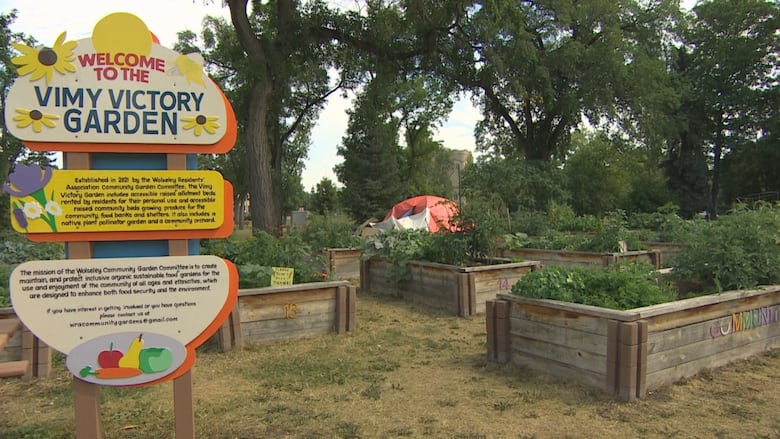Winnipeggers split over councillor's call to ban encampments in outdoor places where children gather
Motion will go for vote in fall over whether to ban camps in outdoor spaces that children frequent

Some Winnipeggers are split on a move that would ban people from living in tent encampments set up in community spaces where children play, with some saying they're OK with the idea and others calling on governments for more housing solutions.
Theresa McKay and her grandson were picking through a community garden at Vimy Ridge Park on Friday, right next to where someone is living in a tent. She said it wasn't a big enough encampment to deter her from the garden.
"If it's a whole bunch, then that's where I probably stay away from the park," said McKay.
Daniel McIntyre Coun. Cindy Gilroy tabled a motion this week, set to go before city council for a vote in September, that recommends banning tent encampments in public places where children gather — playgrounds, spray pads, community gardens and community centre spaces.
McKay favours the idea of a ban, despite being relatively unbothered by the single tent next to the community garden at Vimy Ridge Park. She associates some encampments with drug use and "doesn't want to be around those things."
"I know how they can be with this meth that's going around, be unpredictable, so that's what scares me," said McKay.

Chloe Lepage, who lives near Vimy Ridge Park, sees the presence of homeless encampments in some of these public spaces differently.
"I feel like the issue of homeless encampments and safety are kind of two separate issues," Lepage said.
"I don't really feel that it poses a safety concern to have people living in this neighbourhood, because I feel like they're just people trying to live their lives."

Manitoba Premier Wab Kinew has committed to taking down encampments this year, helping people transition from living on the streets and getting them into housing.
When Gilroy introduced the motion on Thursday, Winnipeg Mayor Scott Gillingham suggested issuing such bans is complicated and potentially litigious.
He pointed to other city governments that have attempted to ban homeless encampments from public spaces that were then taken to court
Gillingham nonetheless expressed frustration on Friday with the pace of encampment removal and related plans.
"I'm not satisfied with the speed at which we're getting housing made available," he said in an interview with CBC's Information Radio. "We need housing so people have a place to move from encampment to housing with wrap-around supports."

The Main Street Project is at the front lines of trying to bring this vision to life.
The organization received an exclusive contract last month for homeless outreach with the City of Winnipeg.
Jamil Mahmood, executive director of Main Street Project, said the protection of public spaces for children is being taken seriously.
"We're in a situation where we don't have enough housing, so I think we can look at how do we find solutions until the housing is built and we have enough," Mahmood said.
Manitoba Housing Minister Bernadette Smith says the province is working as fast as it can to add more affordable housing units to Winnipeg, along with transitional supports necessary for helping ensure those who are housed stay housed.
Smith echoed Gillingham's frustrations over the inadequate housing stock available to make that happen, suggesting the previous Progressive Conservative government was partly to blame for selling off "hundreds of social housing units."
"While it only took seconds for the PCs to sell off housing, it will take time to build up our affordable housing stock," Smith wrote in a statement to CBC News on Friday. "Our government is investing in social housing and supports, and we're working collaboratively to bring more housing online in our province."
In the meantime, Smith said there are safety concerns around having people living in tents in places where children visit.
"Encampments should not be in or near where children are," her statement reads in part. "We will continue to work with police and community partners to protect public safety around child friendly spaces."
Cycling advocate Jason Carter says since the COVID-19 pandemic, cyclists have seen more homeless encampments form along trails that run next to the Assiniboine River. Carter said those trail and riverside areas haven't been taken care of by the city.

Carter, a former president of the Manitoba Cycling Association and current administrator with Bikepacking Manitoba, said he hasn't personally seen as much encampment presence in playgrounds and similar spaces where kids go.
"But it would not surprise me, mainly because it's desperation camping," he said.
"They have no other alternative, and that's what my friends see when we go down those trails — we see this and keep talking [about], 'Well, what in the world is the city doing?'"
Carter said he would be in favour of government-designated encampment areas as a temporary stopgap measure.
"It's a horrible criticism of us as a city, because we're going to such a place where we're such a size and social situation where we need tent villages in order to accommodate," he said.
"But that's happened … in other cities and they're not necessarily permanent, and they at least buy some time before the province gets its act together."
WATCH | Winnipeggers weigh in on banning encampments near places like playgrounds:
With files from Gavin Axelrod


